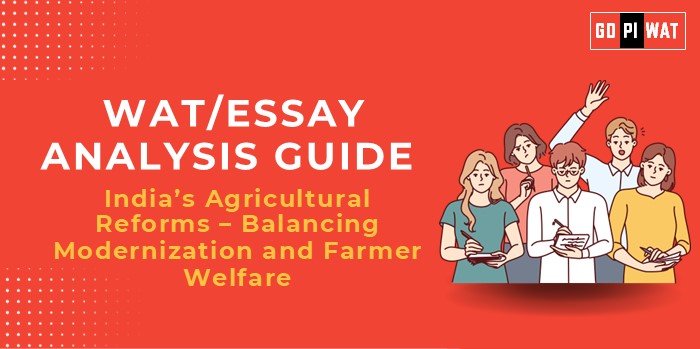📋 Written Ability Test (WAT)/Essay Analysis Guide
📝 Topic: India’s Agricultural Reforms – Balancing Modernization and Farmer Welfare
🌐 Understanding the Topic
🌾 Significance: India’s agricultural reforms highlight the interplay between modernization and socio-economic challenges, a vital topic for aspiring leaders focused on rural development, policy impact, and ethical governance.
📝 Effective Planning and Writing
- ⏳ Time Allocation:
- 🕒 Planning: 5 minutes
- ✍️ Writing: 20 minutes
- 🔍 Review: 5 minutes
- 📋 Preparation Tips:
- 🔍 Focus on balancing arguments with relevant data and case studies.
- 📆 Cite recent protests and reforms to provide a comprehensive analysis.
💡 Introduction Techniques for Essays
- ⚖️ Contrast Approach: “While agriculture contributes 20% to India’s GDP, recent reforms aiming to liberalize markets have sparked unprecedented farmer protests.”
- 📜 Timeline Approach: “From the Green Revolution to the 2020 agricultural reforms, India’s agrarian policies have seen transformative changes aimed at boosting productivity and market efficiency.”
🛠️ Structuring the Essay Body
- 🏆 Achievements:
- 📈 Increased market access for farmers.
- 🚜 Infrastructure investments in cold chains and logistics.
- 📖 Reference: Maharashtra’s reforms have shown the potential for improving farmer incomes through deregulated markets.
- ⚠️ Challenges:
- 📉 Concerns over Minimum Support Price (MSP) guarantees and market monopolization.
- 🌐 Comparisons with the US Farm Bill reveal gaps in safety nets for small farmers.
- 🔄 Farmer mistrust stemming from inadequate consultations.
- 🌟 Future Outlook:
- ⚖️ A hybrid approach ensuring both market efficiency and farmer protections.
- 🌍 Leveraging global lessons, such as EU’s subsidy systems, to strike a balance between equity and deregulation.
📄 Concluding Effectively
- ⚖️ Balanced Approach: “While agricultural reforms offer significant opportunities, their success lies in bridging gaps in trust and infrastructure.”
- 🌍 Future-Focused Approach: “India’s agricultural future hinges on integrating farmer interests with market innovations, ensuring both equity and efficiency.”
📊 Analyzing Successes and Shortcomings
🎯 Achievements
- 📈 Market Liberalization: Increased competition leading to potentially better pricing for farmers.
- 🚛 Logistics Improvements: Enhanced cold storage and transportation infrastructure.
- 🌾 Financial Inclusion: Encouragement of private investment in agriculture.
⚠️ Challenges
- 📉 Infrastructure Gaps: Limited access to modern facilities in rural areas.
- 🤝 Farmer Mistrust: Lack of confidence in government promises around MSP guarantees.
- 📏 Urban-Rural Divide: Inequalities in access to resources and opportunities.
🌍 Global Context
- 🇪🇺 EU Agricultural Subsidies: Ensures farmer incomes while promoting market efficiency.
- 🇺🇸 US Farm Bill: A framework for balancing farmer protection with liberalized markets.
🔑 Recommendations for Sustainable Progress
- 💡 Implement Guaranteed MSP: Complement private market reforms with a robust MSP framework.
- 📱 Expand Agri-Tech: Promote digital tools and technology access in rural areas to improve productivity.
- 🤝 Strengthen Farmer Cooperatives: Enable collective bargaining and better market access.
📚 Sample Short Essays
- ⚖️ Balanced Perspective: “India’s agricultural reforms have sparked critical debates about modernization versus equity. To succeed, these laws must prioritize farmer protection alongside market freedom.”
- 🔍 Solution-Oriented: “The agricultural reforms can transform India’s rural economy by integrating technology and guaranteeing fair prices, ensuring inclusive growth.”
- 🌍 Global Comparison: “Drawing lessons from the EU’s subsidy models, India’s reforms should balance deregulation with safety nets to secure small farmers’ interests.”


